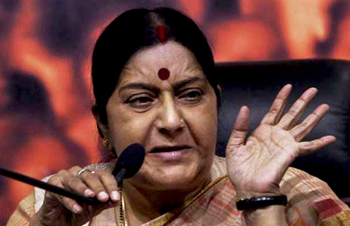New Delhi, Aug 12: External Affairs Minister Sushma Swaraj on Wednesday said her husband Swaraj Kaushal was not the lawyer for former IPL chief Lalit Modi in his passport case and she was not at fault in the issuance of travel documents to him by the British government.
 "I am saying again today that there is no mistake by me," she said while participating in a debate in the Lok Sabha on an adjournment motion on the Lalit Modi issue.
"I am saying again today that there is no mistake by me," she said while participating in a debate in the Lok Sabha on an adjournment motion on the Lalit Modi issue.
The minister said the British government had conveyed that Lalit Modi was given travel documents according to appropriate rules.
Sushma Swaraj said her daughter Bansuri was a junior lawyer in Lalit Modi's passport case but received no money.
"She was a junior at ninth number in the appearance list. She appeared with her senior. Not a single rupee was taken (by her)," Sushma Swaraj said, amid continuous slogan-shouting by Congress members.
She rejected the Congress allegations of a quid pro quo with Lalit Modi.
Sushma Swaraj, who earlier spoke in the house, reiterated she did not help Lalit Modi but his wife who was to undergo a medical procedure for cancer treatment in Portugal.
The minister hit out at the Congress over its allegations on her conflict of interest.
She said when P. Chidambaram was finance minister in the United Progressive Alliance government, his wife Nalini Chidambaram was appointed a lawyer by the income tax department.
She said when an AIADMK member brought this to the notice of parliament, Chidambaram said he had no knowledge of the department's decision.
Sushma Swaraj also cited other instances of alleged conflict of interest by Congress leaders.
The Congress is demanding the resignation of Sushma Swaraj over her alleged help to former Indian Premier League chief Lalit Modi, who is facing investigation by the Enforcement Directorate.





Comments
Add new comment